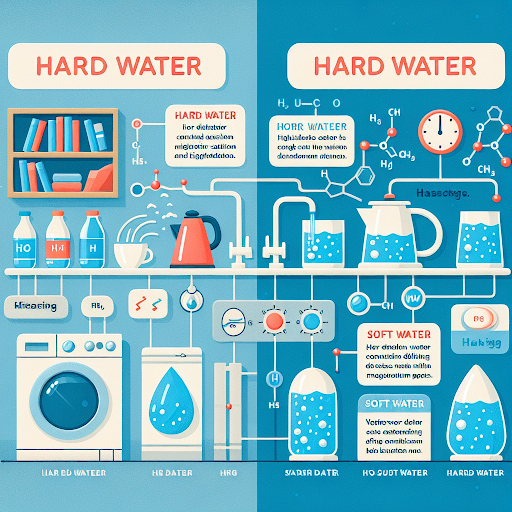Heavy Metals Near Daniel, UT: What You Need to Know About PFAS Chemicals and How to Protect Yourself
Using water filtration systems and filtered water can prevent PFAS contamination and ensure optimal appliance performance. Exposure to PFAS chemicals can negatively impact the immune system, hormone balance, reproductive health, and thyroid function. Small, continuous exposures can accumulate over time, increasing health risks. Methods like PFOS removal and iron heavy metal removal can help reduce exposure. To test for PFAS chemicals, use high end water solutions or install water purification systems. Reverse osmosis and activated carbon filters can effectively remove PFAS chemicals from water. By using the best water purifier for your home, incorporating fluoride removal techniques, and using iron removal filters, you can eliminate PFAS chemicals. Additional steps to protect yourself include using reverse osmosis under-sink systems, choosing PFAS-free products, avoiding known contamination sources, staying informed, and properly disposing of PFAS-containing products.
Table of Contents
- What are PFAS chemicals?
- Why should you be concerned about them?
- What are the health effects of exposure to PFAS chemicals?
- What can you do to reduce your exposure to PFAS chemicals?
- How can you test for PFAS chemicals in your water?
- What are some ways to remove PFAS chemicals from your water?
- Are there any other steps you can take to protect yourself from PFAS chemicals?
What are PFAS chemicals?
PFAS chemicals, also known as per- and polyfluoroalkyl substances, are a group of man-made chemicals used in various consumer products and industrial applications. These chemicals are known for their resistance to heat, water, and grease, making them useful in nonstick cookware, stain-resistant fabrics, and firefighting foams. However, their widespread use has led to environmental contamination and health concerns. As a local, family-owned company, we are committed to providing exceptional service in addressing PFAS exposure concerns.
For residents in Daniel, UT, a thorough understanding of PFAS chemicals is crucial. We know the area; we know what the water quality is like in your neighborhood. Whether you rely on city water or have a well, our team is dedicated to providing effective solutions for both city and well water. We understand the importance of clean, safe drinking water and are equipped with the knowledge and expertise to identify and address PFAS contamination.
When it comes to PFAS exposure, taking immediate action is essential. Our local, family-owned company specializes in offering tailored solutions to meet your specific needs. From conducting comprehensive water testing to implementing effective treatment systems, we prioritize your well-being. With our exceptional service, you can have peace of mind, knowing that we are here to assist you in navigating the complexities of PFAS chemicals and ensuring the safety of your water supply.
Why should you be concerned about them?
One of the main reasons why you should be concerned about PFAS chemicals is their resistance to water. These chemicals are commonly found in products and materials that come into contact with water, such as nonstick cookware and stain-resistant fabrics. This means that there is a high likelihood of PFAS chemicals leaching into the water supply, especially if you live in an area with contaminated groundwater. To ensure the safety of your drinking water, it is important to be aware of the potential presence of these chemicals and take appropriate measures to address any contamination.
Another reason to be concerned about PFAS chemicals is their potential health effects. Studies have linked exposure to PFAS chemicals to numerous health problems, including thyroid disorders, immune system dysfunction, hormone disruption, and an increased risk of certain types of cancer. These chemicals are known to linger in the environment for a long time and can accumulate in the human body over time, posing a continuous risk to your health. By addressing PFAS contamination in your water supply, you can reduce your exposure to these harmful chemicals and protect the health of you and your family.
What are the health effects of exposure to PFAS chemicals?
Exposure to PFAS chemicals can have significant health effects. Studies have shown that these chemicals can negatively impact the immune system, leading to immune system dysfunction and a decreased ability to fight off infections and diseases. PFAS chemicals have also been linked to hormone disruption, which can result in reproductive problems, developmental delays in children, and even an increased risk of certain types of cancer. Additionally, exposure to these chemicals has been associated with thyroid disorders, such as hypothyroidism and thyroid cancer. The long-lasting nature of PFAS chemicals means that even small, continuous exposures can accumulate in the body over time, increasing the risk and severity of these health effects.
Fortunately, there are methods available to address PFAS exposure and minimize its health effects. One effective approach is through PFOS removal. PFOS, or perfluorooctane sulfonic acid, is a type of PFAS chemical that has been particularly studied for its health risks. By removing PFOS from the environment, such as in water treatment processes, the potential for exposure and its associated health effects can be reduced. Another method is iron heavy metal removal, as PFAS chemicals have been found to have a strong affinity for iron. Through specific filtration techniques that target both iron and PFAS chemicals, water sources can be properly treated to ensure the removal of these harmful substances.
At our local, family-owned company, we prioritize providing effective solutions for PFAS exposure concerns and ensuring the safety of your water supply. This is why we only use top-of-the-line equipment in our processes. We understand the importance of clean, safe drinking water and have invested in the best reverse osmosis membrane systems to guarantee better tasting water that is free from PFAS contamination. With our expertise and knowledge, we are dedicated to identifying and addressing PFAS contamination in your water supply and minimizing the health effects of exposure. Trust us to deliver exceptional service tailored to your specific needs, so you can have peace of mind knowing that your water is safe and your health is protected.
What can you do to reduce your exposure to PFAS chemicals?
One effective way to reduce your exposure to PFAS chemicals is by installing a reverse osmosis water filter in your home. Reverse osmosis is a filtration method that uses a semi-permeable membrane to remove contaminants from water, including PFAS chemicals. By installing this type of filtration system, you can ensure that the water you consume and use in your household is free from harmful substances. Not only will this provide you with peace of mind regarding the safety of your water supply, but it will also eliminate the need for bottled water, reducing plastic waste and saving you money in the long run.
It is important to remember that water is something we don’t often think about, as we simply turn on the tap and use it without much consideration. However, water is everywhere and we use it more than we realize. To reduce your exposure to PFAS chemicals, it is crucial to be mindful of the water you consume and use in your daily life. By investing in a reverse osmosis water filter, you can ensure that the water you use for cooking, drinking, and even showering is free from contaminants like PFAS chemicals. Water Science, such as that provided by our local, family-owned company, can take care of the maintenance for you, ensuring that your filtration system is working effectively and providing you with clean, safe water.
When it comes to reducing your exposure to PFAS chemicals, it is important to recognize that everyone’s water needs are unique. That’s why it is crucial to choose a solution that is customized to your home and specific needs. Our local, family-owned company specializes in providing tailored water treatment solutions that address the needs of each individual household. Whether you rely on city water or have a well, our team of experts can conduct comprehensive water testing to identify any PFAS contamination and implement effective treatment systems. With our knowledge, experience, and top-of-the-line equipment, we can provide you with a solution that is specifically designed for your home, giving you peace of mind and ensuring the safety of your water supply.
How can you test for PFAS chemicals in your water?
Water Science has been helping people since 1991, and we have extensive experience in testing for PFAS chemicals.
Our team of experts is trained in conducting comprehensive water testing to determine the presence and levels of PFAS contamination.
By using state-of-the-art equipment and techniques, we can accurately detect and measure PFAS chemicals in your water.
With our knowledge and expertise, we can provide you with the information you need to make informed decisions about the safety of your water supply.
Trust us to deliver reliable and accurate testing results, as we are committed to ensuring the well-being of you and your family.
What are some ways to remove PFAS chemicals from your water?
One effective way to remove PFAS chemicals from your water is by using the best water purifier for your home.
There are various types of water purifiers available, such as activated carbon filters and reverse osmosis systems, that are specifically designed to remove contaminants like PFAS chemicals.
These purifiers work by trapping and adsorbing the chemicals, ensuring that they are not present in the water you consume.
By investing in a high-quality water purifier for your home, you can have peace of mind knowing that you are effectively removing PFAS chemicals and other harmful substances from your water supply.
Not only will this help to ensure the safety of your water, but it will also provide you with better tasting water free from any unpleasant odors or flavors.
After testing the water in your home, Water Science can design a system that is right for you and will remove all present contaminants.
Are there any other steps you can take to protect yourself from PFAS chemicals?
One additional step you can take to protect yourself from PFAS chemicals is to consider using a reverse osmosis under-sink system in your home. This type of filtration system is specifically designed to remove a wide range of contaminants, including PFAS chemicals, from your drinking water. The reverse osmosis process uses a semi-permeable membrane to remove impurities, ensuring that you are consuming clean and safe water. By installing a reverse osmosis under-sink system, you can have peace of mind knowing that you are taking an active step to reduce your exposure to PFAS chemicals and ensuring the safety of your water supply.
It is important to be mindful of the products and materials you use in your daily life. PFAS chemicals can be found in a variety of consumer products, such as waterproof clothing, food packaging, and cleaning products. By choosing products that are labeled as PFAS-free or opting for alternatives that do not contain these chemicals, you can further reduce your exposure. Additionally, it is important to be aware of the potential sources of PFAS contamination in your environment, such as industrial sites or areas with contaminated groundwater. Being informed and taking precautions, such as avoiding areas with known contamination or using protective measures when working with potentially contaminated materials, can help minimize your exposure to PFAS chemicals.
Lastly, staying informed about PFAS chemicals and their potential health risks is crucial in protecting yourself. Keeping up-to-date with the latest research and regulations surrounding PFAS chemicals can help you make informed decisions about your water and product choices. Additionally, educating yourself about the proper disposal of products that may contain PFAS chemicals, such as nonstick cookware, can help prevent these substances from entering the environment. By staying informed and taking proactive measures, you can play an active role in protecting yourself and your family from PFAS chemicals.
The post Heavy Metals Near Daniel, UT: What You Need to Know About PFAS Chemicals and How to Protect Yourself appeared first on Water Science.











